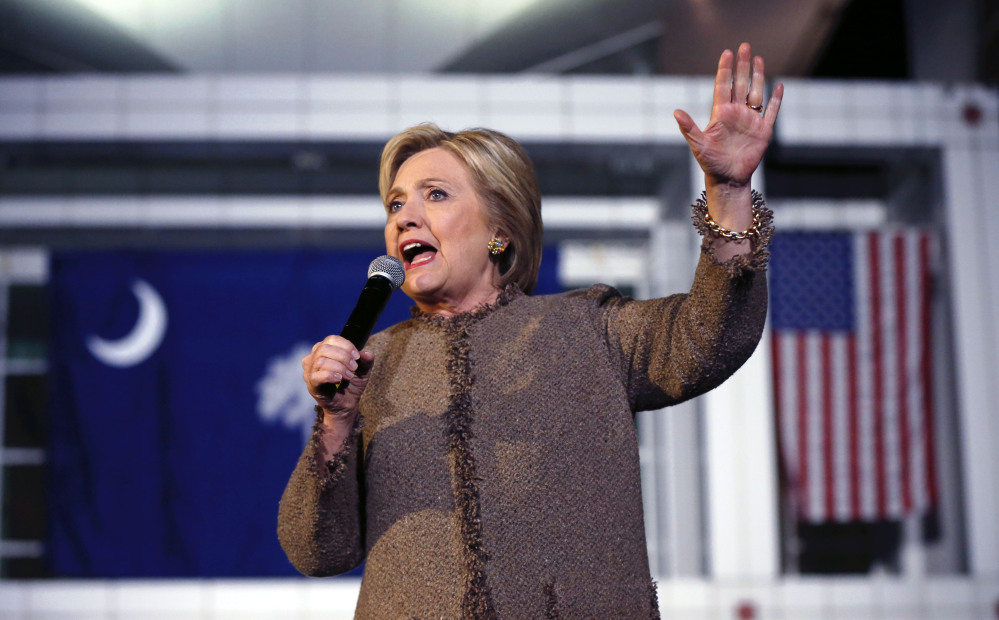ORANGEBURG, S.C. – Hillary Clinton hoped to win and win big Saturday in South Carolina’s Democratic presidential primary while rival Bernie Sanders, expecting defeat, abandoned the state and looked ahead to a strong showing on Super Tuesday.
An impressive victory would help wipe away the bitter memories of her 2008 primary loss to Barack Obama in the first-in-the-South contest, and establish her as the firm favorite among black voters, a crucial segment of the Democratic electorate.
Sanders scheduled events in Texas and Minnesota, two of the states voting Tuesday, and his wife, Jane, said the campaign had to turn its focus away from South Carolina. “We always knew where we would do well and where we would not do so well. It’s a 50-state election and we’re feeling very confident, actually,” she said.
Democrats will vote in 11 states and American Samoa, with 865 delegates up for grabs on Super Tuesday. “I think we’ll split the vote,” Jane Sanders said.
Clinton was set to campaign in Alabama before returning to Columbia, South Carolina’s capital. Polls were to close at 7 p.m.
“The South Carolina primary is personally important to me because I want to send a strong signal that South Carolina is ready for change, ready for progress, ready to make a difference,” Clinton said Friday.
Among early voters, Alicia Newman, a 31-year-old elementary school teacher Alicia Newman from Greenville, said she was torn but ultimately went for Clinton.
“I don’t think Bernie has a shot in a national election, and this election is too important,” she said.
“With all the debates, I think Bernie has helped prepare Hillary for November. That’s good. But now it’s time to get around one candidate and wait for the Republicans,” she said.
But Birgitta Johnson, an assistant professor at the University of South Carolina, said she believes Clinton will “say anything to get votes,” while Sanders “deals with structural issues rather than talking points” on education and other issues important to her.
Sanders knew his prospects with South Carolina’s heavily black Democratic electorate are grim.
The senator from Vermont, where just about 1 percent of the population is black, lacked Clinton’s deep and longstanding connections to the African-American community. He tried to broaden his economic inequality message and touch on issues such as incarceration rates and criminal justice reform, but he struggled to gain traction in South Carolina.
Rather than devote precious time to a state he’s prepared to lose, Sanders spent much of the past week in areas that vote in March.
“We are fighting the fight for the survival of the working class of this country,” Sanders said Friday in Hibbing, Minnesota.
In 2008, black voters made up 55 percent of the electorate in South Carolina’s Democratic primary, according to exit polls. Clinton lost the state overwhelmingly to Obama in a heated contest where her husband, former President Bill Clinton, was seen by some as questioning the legitimacy of the black presidential contender.
But South Carolina voters appeared ready to forgive.
The former president has been well-received by voters as he’s traveled the state campaigning for his wife. Hillary Clinton also received the endorsement of South Carolina Rep. James Clyburn, the influential black lawmaker who stayed neutral in the 2008 primary, but was critical of the former president’s comments.
Clinton’s campaign saw South Carolina as an important jumpstart heading into a busy March. More than half of the delegates up for grabs in the Democratic race are on the table in the next month.
While Sanders has the money to stay in the race deep into the spring, Clinton’s campaign saw a chance to build enough of a delegate lead to put the race out of reach in the coming weeks.
Clinton has a one-delegate edge over Sanders after her narrow win in Iowa, her sweeping loss in New Hampshire and a five-point victory in Nevada. She also has a massive lead over Sanders among superdelegates, the Democratic Party leaders who can throw their support behind a candidate of their choice, regardless of how their states vote.
Pace reported from Washington. Associated Press writers Meg Kinnard in Hibbing, Minnesota, and Catherine Lucey in Columbia, South Carolina, contributed to this report.
Follow Julie Pace and Lisa Lerer on Twitter at: http://twitter.com/jpaceDC and http://twitter.com/llerer
Send questions/comments to the editors.



Success. Please wait for the page to reload. If the page does not reload within 5 seconds, please refresh the page.
Enter your email and password to access comments.
Hi, to comment on stories you must . This profile is in addition to your subscription and website login.
Already have a commenting profile? .
Invalid username/password.
Please check your email to confirm and complete your registration.
Only subscribers are eligible to post comments. Please subscribe or login first for digital access. Here’s why.
Use the form below to reset your password. When you've submitted your account email, we will send an email with a reset code.